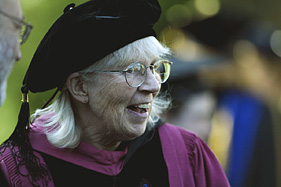Anne B. Thompson
Tribute to retiring faculty member Anne B. Thompson, Professor of English and Euterpe B. Dukakis Professor of Classical and Medieval Studies, by her colleague Carole A. Taylor, professor of English

Anne once remarked that retirement encomiums tended to sound like obits, but though she’s busy in Widener proofing an article with a deadline, that fact shows her as vital and energetic as ever (“spry,” she would say).
Anne came from Harvard to Bates in 1973, and has exemplified for so many of us who have loved and needed her the best way to combine the intellectual, scholarly life, total devotion to students and teaching, the intense commitments and intimacies of familial life, and a passion for social justice. She picked me up for my interview at the Lewiston airport (“Scare New England” then), and her car told of a rich life: children’s paraphernalia, medieval texts, and on top of student papers, the largest axe I had ever seen. I knew this was a woman to be reckoned with, and more than a quarter-century only increases the reverence.
As an extraordinary and beloved teacher, one who manages to sustain relationships with so many students over time, Anne routinely convinced students who did not yet know the glory of medieval literature that they wanted to know it. As one student put it to me this year, “I took the Troilus and Criseyde seminar because I needed a pre-1800 course, but by the end I felt that I’d done something both more concrete and more literary than I’d ever done before.” A medievalist to the marrow, Anne understood that the canonical texts were not in competition with contemporary ones, and typically, her Dukakis chair talk focused on the classical and medieval through the living lens of Derek Walcott. Her vast, ecumenical reading informed a broad range of courses, and, of course, her impressive and continuing scholarship.
Anne wrote on subjects from Chaucer to Willia Cather, but fascinated by “the practice of hagiography,” she sustained a lifelong work on the narrative art of saints’ lives, culminating in Everyday Saints and the Art of Narrative in the South English Legendary (2003). Extremely positive reviews praised this book for “look[ing] beyond generic boundaries — particularly those between religious and secular literature,” for providing “a series of remarkably attentive close readings that hold a magnifying glass to this text,” and for “illuminating the ways in which poets writing in English…create[d] a narrative style that [c]ould convey divine truths in a language rooted in real human life.” In no way slouching toward retirement as a scholar, Anne has co-edited a recent collection called Saints’ Legends from Middle English Collections and is at work on an edition of The Northern Homily Cycle, to say nothing of ongoing creative work and the sheer pizzaz of the forthcoming Rereading Fifties Teen Romance: Reflections on Janet Lambert.
No paragraph short of a prose poem could pretend to circumscribe Anne’s quickness of mind and heart, her wit, her sense of fun, her delight in friends, music, charades (at which she’s wicked good), and that moral integrity that every gesture evinces; but I’ve collected some I hope luminous details here from words either spoken or written for Anne on the occasion of a party for her in December. On her importance to English, CMS, and others: “You have been for so many years the glue for the English department, that in your honor, we will do our best not to come unstuck; you set the example for all of us in living a principled life and in consistently, even under the most difficult circumstances, speaking truth to power, your passionate leadership is why CMS exists.”
And on what she meant, as the second woman tenured at Bates, to all us who came after: “During those early days, when our voices sounded tiny and shaky, you made it alright to be here, to hear the sound of our voices without embarrassment; you were a trailblazer and an inspiration to women faculty, and mattered especially to single mothers and anyone else struggling to balance careers and children; you are the woman I would always have wanted to be: omni-competent, a real intellectual, eloquent, brave and unflappable.”
Clearly, for what we feel about Anne, the abbreviated paean will not suffice, because her like will not pass this way again.